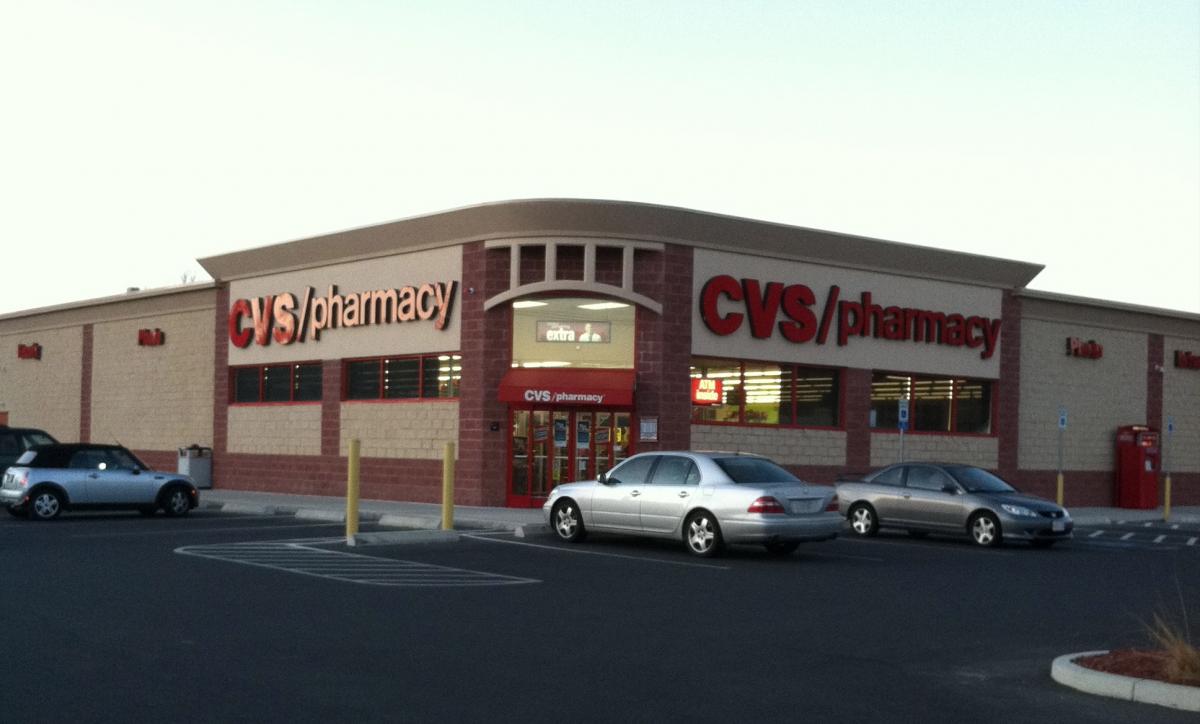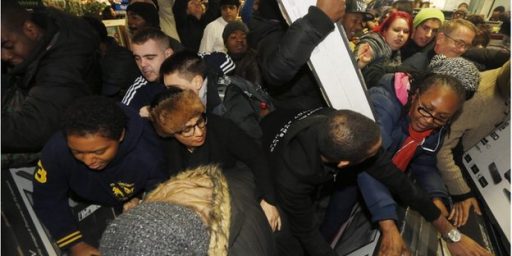Professional Shoplifters
A few people are committing the lion's share of petty thefts in America's biggest city.

A really startling story in the NYT: “A Tiny Number of Shoplifters Commit Thousands of New York City Thefts“
New York City’s storefront businesses, already weathering inflation and an uneven recovery from the coronavirus pandemic, are also contending with what the police say is a dramatic increase in shoplifting. But statistics also reveal a startling reality: A relative handful of shoplifters are responsible for an outsize percentage of retail crime.
Nearly a third of all shoplifting arrests in New York City last year involved just 327 people, the police said. Collectively, they were arrested and rearrested more than 6,000 times, Police Commissioner Keechant Sewell said. Some engage in shoplifting as a trade, while others are driven by addiction or mental illness; the police did not identify the 327 people in the analysis.
Doing some quick math, 327 people being arrested 6000 times comes out to an average of 18.35 arrests per. In a single year. That’s almost 20 arrests per person per year!
At some point, wouldn’t it make sense to, I don’t know, put them in jail?
The victims are also concentrated: 18 department stores and seven chain pharmacy locations accounted for 20 percent of all complaints, the police said.
Petty thefts are one of the main drivers of the city’s overall crime rate, even as murders, shootings and other violent crimes have continued to drop. At a recent news conference, Commissioner Sewell said the situation demanded a “perpetual carousel of police resources.”
Again, I believe I have a solution that would easily cut NYC’s shoplifting rate by a third.
Criminal justice reform advocates have said that petty thefts are a crime of necessity, and that many down-on-their-luck New Yorkers are stealing what they need to survive in one of the world’s most expensive cities.
Oh, for fuck’s sake. There are some 8.5 million people living in NYC. All but 327 of them seem to be getting by without repeatedly stealing. And I can’t imagine a city in America with more resources to help out the down-on-their-luck.
But law enforcement and trade groups have blamed a proliferation of organized shoplifting crews, repeat offenders and the new state bail law that they argue has enabled such offenders to avoid jail time.
Last year, 41 people were indicted in New York City in connection with a theft ring that state prosecutors said shoplifted millions of dollars worth of beauty products and luxury goods that were sold online.
Hmm. This really, really doesn’t scream “crime of necessity.”
By the end of 2022, the theft of items valued at less than $1,000 had increased 53 percent since 2019 at major commercial locations, according to a new analysis of police data by researchers at the John Jay College of Criminal Justice.
Over the past five years, shoplifting complaints nearly doubled, peaking at nearly 64,000 last year, police data shows. Only about 34 percent resulted in arrests last year, compared with 60 percent in 2017.
Businesses large and small are grappling with “smash and grab” thefts, said David Johnston, vice president of asset protection and retail operations at the National Retail Federation.
“It’s the loss coupled with the violence and the concern of safety,” he said.
Representatives for major retailers in the city, including CVS, Macy’s and Target, did not respond to requests for comment on shoplifting in New York. A spokeswoman for Walgreens, Kris Lathan, said the company had created a “major crimes unit” to assist authorities with investigations.
On the one hand, petty theft has always been something retailers had to live with as a cost of doing business. I suspect that’s especially true of stores like CVS, which are in the business of selling small, convenience items. There’s only so much of the merchandise that can be kept locked up, requiring customers to find a clerk for access, without driving said customers away. On the other, they can afford to install security cameras and otherwise make it easier for police to apprehend the perpetrators.
The anecdotes got pushed into the body of the piece here but they’re useful:
Small proprietors are scared, said Youssef Mubarez, whose family has owned a deli in Times Square for decades and who is also the director of public relations with the Yemeni American Merchants Association. The group has roughly 3,000 members who own delis and bodegas.
Since the pandemic, Mr. Mubarez’s cousin, who works at the family’s bodega, has encountered routine fights, Mr. Mubarez said, and some have involved knives. While opinions on what is behind the surge in shoplifting varies even among members, they all agree it’s more prevalent, he said.
“Every day, they’re going into work as they usually do and they’re not sure if the person walking in is there to rob them, going to steal from their store or start an issue where it just escalates to a point where they can’t control it,” he said.
Accosting a shoplifter is a risk each time, said Tchalare Idrissou, a clerk at the 99 Cent Zone store in the Mott Haven neighborhood of the Bronx. Recently, clerks at the store confronted and threw out a man they had seen shoplifting twice before on security camera footage.
“When you’re trying to stop them from stealing, they engage and try to fight,” Mr. Idrissou said, adding: “Sometimes we let them go with the stuff, because sometimes some of them have the weapons. Sometimes knives.”
Clerks described catching people walking out with items stuffed into their coats, sweaters, or down their pants. They kick them out of the store, they said, only to see some of them return. In other instances, they wouldn’t know how the shoplifter got away until they watched surveillance video.
Obviously, we can’t expect minimum wage clerks to risk physical harm to protect merchandise.
On the other hand, we get this:
Shoplifting is a crime of poverty, said Arielle Reid, supervising attorney of the Decarceration Project at the Legal Aid Society, New York’s largest provider of criminal and civil services for indigent clients. It can’t be solved by a continued reliance on “the heavy hand of law enforcement,” she said.
“Our clients and our communities are better served by investments in resources to break these endless cycles of incarceration,” Ms. Reid said.
Again, that’s just unpersuasive. The poor don’t organize into “rings” to steal cosmetics.
The authorities take a harder line.
“Shoplifting, retail theft and commercial burglaries have escalated dramatically in recent years, and as a consequence, the consumer experience has suffered,” said Michael E. McMahon, the Staten Island district attorney. He blamed “reckless policies” for making businesses “less safe and under constant attack from rampant recidivism.”
Collective Action to Protect Our Stores, made up of 5,000 businesses in New York State, called on lawmakers to create units in the Police Department and prosecutors’ offices dedicated to retail theft and to offer more protections to retail employees who are attacked.
The obvious counter is that heavier policing is going to inevitably target minorities and the homeless. I haven’t the foggiest how we balance that against enforcement of the laws. Is there an amount of shoplifting that we just chalk up to “that’s life”?
A bill introduced in Albany this year by Assemblyman Manny De Los Santos would elevate assault of a retail worker to a felony, in line with the penalty for attacks against police officers, transportation employees and nurses.
I find proposals like this exasperating. Why create special categories of people who are more protected the laws than others? I at least understand the notion that police officers are representing society, so an attack on them is an attack on the people themselves. But it makes no sense at all to make hitting the clerk at 7/11 a more serious crime than hitting, say, a dock worker.
In December, Mr. Adams hosted a summit at Gracie Mansion to create a citywide plan to combat retail theft. Joined by law enforcement agencies and trade leaders, he said businesses were “the lifeblood of our economic recovery,” adding “we are not going to stand by and let criminals undermine our economy and the livelihood of New Yorkers.”
Mr. Adams has lobbied to toughen the state’s bail law, and the measure has once again turned into a divisive point in Albany’s budget negotiations.
After Republicans used the law and concerns over crime to capture key seats in last year’s midterm elections, Gov. Kathy Hochul, a Democrat, proposed modifications to the law that could keep more people in jail. But her fellow Democrats, who control the State Legislature, have firmly pushed back.
While “law and order” has long been derided as a racial dog whistle, it’s harder to make that charge when it’s a Black mayor pushing to protect businesses in one of the most diverse cities on the planet.
As politicians debate, businesses and residents are acting on their own.
In Harlem, a coalition of proprietors and officials from law enforcement and city agencies started meeting a year ago to address problems in the neighborhood’s 125th Street Business Improvement District.
Thanks to the group, the local police precinct was able to identify 18 people who had been seen shoplifting repeatedly, said Barbara Askins, the president and chief executive of the business district and a member of the Manhattan district attorney’s Manhattan Small Business Alliance, which was created to reduce shoplifting and robberies throughout the borough.
Those 18 names were sent to prosecutors, Ms. Askins said. And with a $20,000 grant from the district attorney’s office, the business improvement district plans to hire two part-time employees to engage with businesses and the community.
“We try to seek solutions, try to come up with creative solutions around existing laws to try to find a way to try to address this problem,” Ms. Askins said.
This seems less a “creative solution” than what would seem a perfectly normal relationship between the community and its police force.






That a large portion on NY’s shoplifting is done by a relatively small number of people doesn’t surprise me. Dig into the statistics for any number of crimes, catalytic converter thefts, sell phone, dash and run jewelry and watch theft, and you’ll see that it is undertaken by organized gangs. Recently the Feds arrested dozens in an investigation of catalytic converter thefts.
The perps in these crimes don’t fear being caught and if they do, the charged is plead down. It was reported a couple of months ago, that half the murders in the US are unsolved, if 50% of murders are unsolved what’s the percent of petty crime unsolved?
A friend in Mpls is a member of his neighborhood group and they’ve been told that a significant portion (can’t remember the percentage) of the petty and gang related crimes, including business murders, was perpetrated by 100 families. Whether that is true or not, I don’t know, but if it is, it’s damning indictment of the criminal justice/law enforcement system.
And yes, the people are only stealing necessities argument is lame.
Re: “Oh, for fuck’s sake.” My exact reaction to DC’s councilmember Brianna Nadeau when she told a pregnant woman that was mugged of a laptop “imagine if you were poor and saw people walking around with things you can’t have”, confirming my need to sell my house and GTFO!
One other thing on this article. I’m not sure the stats are believable because of diversion programs. If NYC is like DC, then a person can get arrested any number of times for a crime and if they enter a diversion program then it does not go on their record.
@HelloWorld!:
Pretrial diversion programs are typically not offered to repeat offenders. While a crime may no go on this public record, DAs will still see that and it usually will disqualify them from future diversions.
So they are not a get out of crime free card.
They largely show the numbers, at best, at the margins.
Generally speaking, there does need to be some form of repeat offense built into pretrial detention laws for nonviolent crimes (including misdemeanors). The problem is that the reactionary bail reforms that Adams and others have pushed for go well beyond addressing the issue of the tips of organized shoplifting we see in the case above.
You know, the fact that there are organized rings of shoplifters making bank by taking advantage of lenience in the criminal justice system is a kind of object lesson. The world doesn’t stand still, the culture is not static. Criminals adapt to the times, and that means that the tools to limit them also need to adapt.
Of course, these people are why we can’t have nice things.
AOC has said on at least two occasions that people only shoplift to feed and medicate their children.
I would have a lot easier time seeing the crackdown advocates as good-faith arguers if they didn’t keep using this to push for the reinstatement of harsh bail laws. You want to increase penalties for those found guilty? Great, let’s figure that out. But bail is for people who have not yet been found guilty, and thus are innocent in the eyes of the law.
Of course it’s a lot easier to throw suspects into jail for months or years without a trial than it is to reform the various DA’s offices so that it doesn’t take months or years to try them. And hey, why should the people in charge have to break a sweat when you can just put it on a bunch of poor Black folks who can’t afford a lawyer?
I can see a one time shoplifter stealing if desperate, but at the scale described it harms the entire community. They need some jail time and for repeats at that scale it needs to be longer. The refusal to address this obvious problem makes it more likely that we get changes that will be harsher where not needed.
Steve
Be careful of the bait and switch.
As in, how the article blithely conflates professional rings of thieves stealing thousands of dollars of merchandise with mentally ill and homeless people stealing a can of soda.
We saw this with the drug war where breathless articles would talk about brazen drug dealers driving Lambourghinis and having pallets of hundred dollar bills. Which led to asset forfeiture laws.
Which now results in petty drug addicts having their junk cars which they sleep in, confiscated by the cops.
Remember “Three Strikes”? How all these stories about brazen criminals laughing as they committed crime after crime with impunity, which lead to laws enabling a 25 year sentence for even a minor offense.
Which results in a guy getting sent away for 25 years for stealing a slice of pizza.
@Jay L Gischer:
Lets consider that, if you are a professional ring of thieves stealing thousands of dollars in merchandise, you are already committing a felony for which you can draw a lengthy prison sentence.
Are professional thieves caught and convicted of stealing thousands of dollars in merchandise being released without punishment? Or is this just the conclusion the article hopes to convey?
This will, one assumes, be used to attack DA Bragg for going after Trump instead of fighting local crime. and there may be some justice to that. But this problem long predates Bragg and other cities have the same problem. It smells of a systemic disinterest by the police and prosecutors in pursuing “petty” crime and/or providing effective policing in minority neighborhoods. I’m unsurprised theft at Yemeni owned bodegas isn’t a priority. But you’d think CVS and Walgreens could get some attention. As @Jay L Gischer: said, the crooks are adapting. The system, not so much.
A version of this conversation is occurring in San Antonio. We have a Proposition A on the ballot. Early voting starts on 24 April.
‘Misinformation and fear’: Policy nuances lost in Prop A debate about cite-and-release
Among other issues:
The real battle is over making mandatory the cite and release policy and eliminating police discretion.
It will be voted down.
However, there is some interesting information about the current discretionary cite and release policy. The District Attorney runs a Cite and Release Diversion Program.
As they say, it’s complicated.
Is it wrong that I immediately thought we need a DoorDash for shoplifters? If the shoplifters took orders they could charge more than if they just dump off a load on some two-bit fence. Basically right now they’re charging below wholesale, they could be charging below retail.
I’ll just wait for the obligatory follow-up post:
@Michael Reynolds: My eldest brother used to do that, back in high school. Dude always had some kind of scheme going*.
He was a bit morally flexible, but at least he didn’t get into conspiracy theories, so he was better than my other two brothers.
His widow is active in the Republican Party in Florida, so it’s possible that he just missed the opportunity to fall down a popular rabbit hole, but I like to think he would have found a bit of right wing grift and stolen from terrible people.
*: Seldom really good schemes. One involved serving “one day past their prime” steaks, so he could pocket the fresh steaks while claiming to have thrown out the old ones. Bigger things later in life, but all of the same level of seediness.
@Chip Daniels: By the fact set described, presuming it is accurate, the professional theft ring is rather exploiting exactly the lack of charging and the difficultly in constructing an overaraching case – which then makes your response rather exactly the basis they exploit.
@Lounsbury:
Which is why I say beware of the bait and switch, where a clever band of professional criminals exploits a weakness in the criminal justice system, and suddenly we are besieged with calls to increase the penalties for the guy who snatches a bottle of soda.
A lot of “LAWN ORDER!1! hysteria is really like the drunk searching for his keys under the streetlight, because the lights better.
Brutalizing the homeless guy who takes a bottle of soda is easier than addressing why it is that the entire police and judicial system can’t seem to put away organized criminals committing things already a felony.
@Chip Daniels:
I’ve always assumed that it’s because there are more homeless guys stealing a soda, so throwing the book at them looks more efficient and because the organized criminal gangs committing felonies are more likely be able to use intimidation and the difficulty in gaining convictions against organized crime entities. Then again, I’m a lefty, so that’s probably wrong.
@Just nutha ignint cracker: Next to last line in my comment should read “use intimidation and capitalize on the difficulty…”
On the store side, I’d be curious to see how shoplifting trends line up with the proliferation of self-checkout. While it doesn’t excuse people stealing or not holding those who do steal accountable, we can’t ignore that some stores are making it easier to steal in order to save on employee costs. Hell, I’ve accidentally “stolen” things at the grocery store — usually gallon jugs of water I put under the cart and forget to scan at the self-checkout lane.
I don’t mean this as any sort of victim blaming but there are solutions that go beyond more police and harsher sentencing.
One thing to point out here is that many stores have reduced or outright eliminated their security workers and now want to push that job onto the police so that they can increase their profits at the expense of the taxpayers.
@Stormy Dragon:
Portage considers fining businesses for calling the police too often
@Stormy Dragon:
Sounds like the American Way to me. What are you, some kinda commonist or something?
Maybe this would be a good time to mention that Walgreen’s, one of the entities that started the current hysteria over shoplifting by claiming publicly that their losses from the crime were so great they would be closing stores, later admitted that they had got the numbers entirely wrong, and there was barely more shoplifting than there ever had been.
But of course by then, the damage was done.
Petit Larceny does have a maximum sentence of a year in jail. While it doesn’t get rolled out very often, I expect that it is more likely after your 10th conviction.
While I have no strong objections to a “20 strikes and you’re out” policy, I have to wonder how a police department with a $5.3B operating budget ($10.9B total budget) cannot make a case against the people running this shoplifting ring, the people buying stolen property, etc.
I also have to wonder if these 327 people arrested 6000 times account for a third of all shoplifting, or if they just suck at shoplifting, or what.
If you’re getting arrested every two to three weeks, and spending a good chunk of a day going through the system to get arraigned, you either have to be very, very stupid (NY eliminated cash bail for misdemeanors, so it’s basically “catch and release”, but there are still going to be trials and convictions and 20 of those a year is going to be a bummer), or there is something else going on.
The article is paywalled, so I don’t know if they get into that, but it feels like we are missing a chunk of the story.
Adams was a cop. The Black is only skin deep, but the Blue goes into the
bonerbones.I think we also need to think a bit about how police fit into the picture. I hear a lot of stories about cops responding to things like car break-ins and telling victims “there is no point in even arresting them, they just get released”. So is this bit of now common wisdom true? Do officers just not want to make the effort to fight low-level crime?
As someone who’s been driving on California freeways since the 70s, I wonder almost every time I’m on the road where exactly the highway patrol is. Pretty much every time I am on the freeway, one or more 95mph, kamikaze lane changers blow by me. It’s not uncommon to see people actually racing on the freeway.
The CHP seems to be almost wholly MIA. Rare to see one on patrol, even rarer to see a car actually pulled over.
I get the sense that since the George Floyd murder, the attitude of law enforcement towards the public has a strong undercurrent of “If you do not give us absolutely free reign to do anything we please, we are not going to bust our tails for you”.
@wr:
Yeah, the Walgreen’s thing is very typical of what is going on now. Then we have the recent murder of Cash App founder Bob Lee in San Francisco, instantly put forward on the right as an example of the horrible, awful, unbelievable level of violent crime in liberal SF.
As we now know, Lee knew his killer, and his murder had nothing to do with street crime, homelessness, etc. I’m not holding my breath waiting for Elon Musk and his ilk to come forward and admit that they were wildly wrong and simply trying to score political points off of a tragedy. Or that four cities in Texas have higher violent crime rates than SF.
@Gustopher:
Seriously.
If you really want to end prostitution, you start throwing the johns in jail. We don’t do that, because some of them are
upstandingrich citizens. An enforcement campaign that didn’t care about the shoplifters themselves and started putting away the fences under RICO would make a big difference, quickly.@anjin-san: ” I’m not holding my breath waiting for Elon Musk and his ilk to come forward and admit that they were wildly wrong and simply trying to score political points off of a tragedy.”
In fact, one of them was already asked and his response was basically that it could just as easily have been random street crime because homeless people, so he was actually right, despite the fact that he was wrong.
This number seems a bit sketchy to me, especially since zero info was supplied by the police. Everything else in the article is PR people talking.
That said, the fact that there’s an organized group of shoplifters shouldn’t be surprising. But shoplifting is not a skilled crime. If there’s a black market for baby formula or detergent it would be easy to find other people willing to be the thieves. More importantly, what exactly is the point of scrambling around to fight the scourge of the baby formula trade? What resources should be devoted to ensuring that poor people pay retail for baby formula or Tide?
@anjin-san:
The short answer is that the rich people on Twitter screaming about crime love power, and when you worship power, everything is about the end and total victory or loss.
During the Wild West, those 327 people responsible for thousands of crimes in NYC would not have been allowed to continue operating. In the age of Bonnie and Clyde and Dillinger, repeat offenders (especially violent ones) were taken out of circulation one way or another. In the event of a societal collapse, these 327 would represent a predatory threat to other people and would have to be dealt with. I suspect that only in New York City could these 327 people continue as they have been doing. In certain states, they would already be out of circulation.
@Chip Daniels:
It also results in towns/cops committing whole scale robbery of anyone they target. “oh gee that money looks like drug money and so does that ring hand them over!!”….
Time and time again it’s shown that it doesn’t matter if there’s no crime and no drugs the cops will still rob people under asset forfeiture..
@wr: https://fair.org/home/shoplifting-is-big-news-stealing-millions-from-workers-is-not/
A story about Walgreens, shoplifting and wage theft.
@Rich Vernadeau: “In certain states, they would already be out of circulation.”
Sure. In Tennessee, for instance, various state legislators want to see people like this “hanging from trees.” Of course we used to have a word for when vigilante mobs seized accused criminals before they could be tried and murdered them, usually by hanging. If you are recommending we go back to the days of lynchings, then you should be seriously reconsidering the life choices that got you to this point.